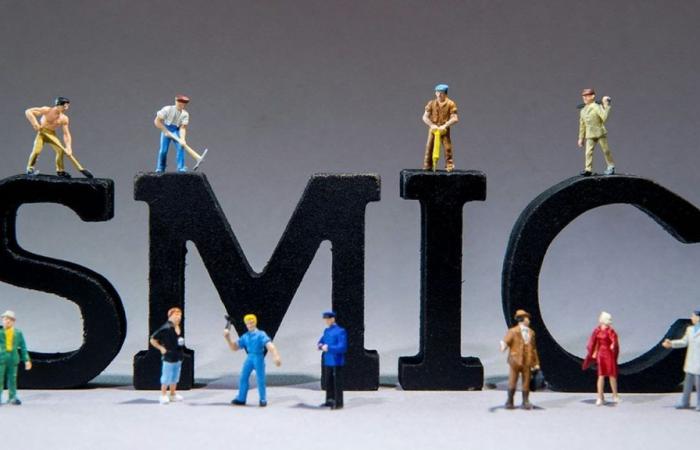Barely appointed Prime Minister, Gabriel Attal made it a point to “discard” France. If it wins the legislative elections, will the New Popular Front do just the opposite? In the name of defending purchasing power, the alliance of the left promises to increase the legal minimum wage to 1,600 euros net, or 200 euros more (+14.3%). Such a boost would be almost unprecedented in its scale: in 1981, the Mauroy government granted a 10% increase. To the point of raising many questions about the associated budgetary and social cost.
Unsurprisingly, this measure goes down very poorly with employers’ organizations. Impossible to absorb such a shock. Competitiveness and therefore employment will suffer the consequences, they warn. The Montaigne Institute estimates the cost to public finances due to losses in social security contributions at 3.5 billion… “The situation is serious,” warned the president of the U2P, Michel Picon, on RTL.
No less than 8 revaluations
The only salary indexed to inflation, the SMIC has seen eight increases since 2021 given the surge in prices. As a result, there are 17.3% of employees paid at this level, a record. A record that would quickly be broken since all those who are paid between 1,400 and 1,600 euros are potential “smicards”. Gabriel Attal’s campaign team estimates that their proportion would reach 25%.
Unless the promised boost spreads from above, which the New Popular Front (NFP) is sure of. That is to say if wages increase more than inflation, since it returns to normal, and the minimum levels of sectors are revalued. We will thus avoid a decline in the level of the SMIC.
“We do not fear this settling effect,” assures Hadrien Clouet, outgoing LFI deputy for Haute-Garonne. Diffusion will be even stronger, he adds, thanks to the fiscal measures (greater progressivity of income tax) or social measures (revision of the scale of contribution reductions) that the NFP intends to put in place.
To the point of destroying jobs? There is no consensus on this point. On the one hand, the cost of labor at the minimum wage level will increase, to the detriment of the low-skilled. On the other hand, it will decrease for employees paid above since they become eligible for reductions in contributions. Added to this are the effects of an increase in purchasing power which promotes consumption and therefore hiring. We must also take into account the impact of measures to correct the excess public deficit which can act in the opposite direction.
” The echoes “
All in all, the Montaigne Institute predicts 33,000 jobs destroyed. Economist at the OFCE, Eric Heyer arrives at around 50,000, but recognizes the limit of his model, never tested in the light of such an increase. For Gabriel Attal, 500,000 positions would go up in smoke. “Out of prudence, we assume that there will be no creation of jobs, but no destruction either,” defends Hadrien Clouet, convinced that increased consumption will outweigh the increase in labor costs. in VSEs and SMEs.
To help them get over the course, the New Popular Front plans to cap rents, as well as energy prices (by setting a maximum price at the expense of energy companies or by compensation financed by the tax on super profits). ). The national secretary of the Communist Party, Fabien Roussel, spoke of a compensation fund. “These are redistribution measures between companies and producers: large producers will contribute for the small ones”, again according to Hadrien Clouet, this “pooling” of the increase in the minimum wage therefore costing nothing to the State coffers.
“This proposal smacks of the 1970s and misses the problem. The problem is not that people are paid the minimum wage, it is that they remain paid the minimum wage,” said Gilbert Cet, professor of economics at Neoma Business School and former president of the group of independent experts on wages. minimum. For him, poverty will increase due to the low-wage trap effect.
Frustrated employees
Even if their existence has not been demonstrated, these low-wage traps are associated with cross-effects between thresholds for exemption from employer contributions, payment of social benefits (mainly activity bonus) and income tax. Reforming this “socio-fiscal wedge” which leads from the pay slip to disposable income around the minimum wage is the challenge of the Bozio-Wasmer mission. The Macron camp has put forward some ideas to push companies to increase wages without the employee losing too much.
In a study commissioned by the High Council for the Financing of Social Protection, the Rexecode institute makes its contribution to the debate. From surveys of companies in particular, it appears that 8% of responding companies in terms of workforce say they are “regularly confronted with obstacles to salary progression” mainly due to this socio-fiscal wedge.
“It’s a minority but significant proportion,” underlines the director of studies, Olivier Redoulès. Except that this reason is mixed with others: insufficient margins or cash flow, impossibility of passing on a salary increase in prices… Conclusion, “social-fiscal measures seem to reinforce, more than they create, the obstacles which are assigned”.
The biggest increases in the minimum wage” The echoes “






